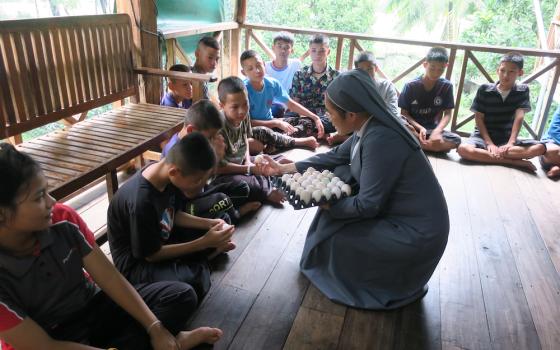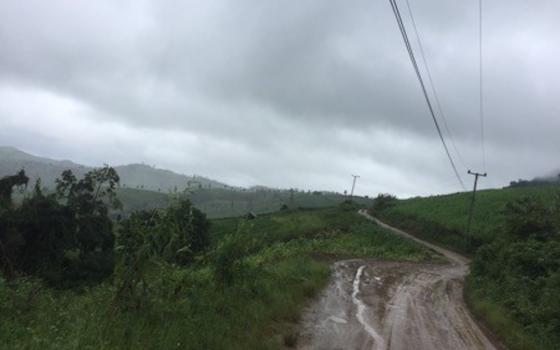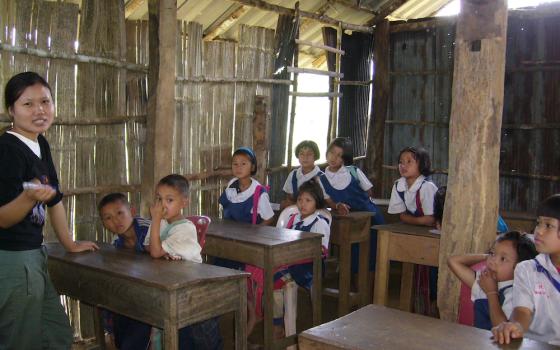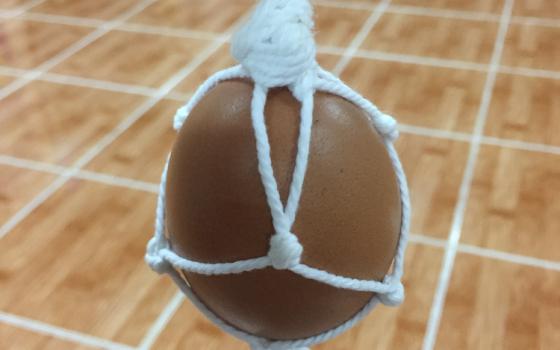Editor's note: Global Sisters Report is focusing on the efforts of sisters to end human trafficking as Talitha Kum, the international anti-trafficking network of religious, marks its 10th anniversary and launches its Nuns Healing Hearts campaign. The special series will run periodically through September, when Talitha Kum will hold its first general assembly. Since its founding in 2014, GSR has dedicated a section of its coverage to sisters who in various ways fight human trafficking. Read all of our coverage.
Being assigned to a hill tribe in Mae Jam, Chiang Mai, a northern area of Thailand, changed the life of Sr. Marie Agnes Buasap, a Sister of St. Paul de Chartres. Her congregation has been in Thailand for 120 years and has 22 schools for students from kindergarten to high school.
Why was Sister Marie Agnes chosen for this remote mission? She could speak the tribe's dialect and was adventurous. The mission, situated on the cliff of one of the highest mountains of the region, made travel, even walking, very dangerous, especially during the rainy season. But Sister Marie Agnes, eager to go, loved the place. The people taught her a new, simple way of living with few comforts, not even electricity or telephone service.
I met Sister Marie Agnes in January in Bangkok, where she now works at Assumption Convent School, a private girls' school. Her newest mission is being the provincial representative to Talitha Kum Thailand, an adventure she unwittingly prepared for while working in Mae Jam. She and her companions became aware of many young women disappearing from the hill village and investigated the cause. Discovering trafficking, they were able to rescue one group of girls and return them to their families by paying money to the traffickers, but this action was not sustainable.
Thus, the St. Paul de Chartres province built a house to protect the girls from the trafficking circle. They attended nearby public schools until the sisters built a boarding school, Princess Ubolratana School in Chiang Dao, Chiang Mai, for seventh- to ninth-graders. The sisters were convinced that education could prevent girls' families from selling them to traffickers and offer alternatives for employment, a strategy that has saved many.
Later, the sisters built another school, St. Joseph School of Mae Chaem, to honor 100 years of education ministry in Thailand. This social welfare school for disadvantaged tribal children opened in 2008 in a remote Karen village in the mountains of Chiang Mai with 400 students, kindergarten to Grade 9. Sister Marie Agnes became the first principal.
At the same time, trafficking of persons was becoming better understood globally. In 2009, the International Union of Superiors General (UISG) assembly formed Talitha Kum, an international network of women religious against trafficking. The Sisters of St. Paul de Chartres joined this initiative with other women religious institutes in 2013, forming Talitha Kum Thailand.
In June 2018, the Thai government recognized Talitha Kum Thailand with an award as the best Thai organization to combat trafficking. Even though the government itself has many policies in place to stop all kinds of trafficking, it is not consistent in implementation.
Soon after Sister Marie Agnes officially began her work in anti-trafficking, she received a scholarship from UISG to strengthen her skills in this special ministry. In February, she completed the two-year program, having participated in both residential and online programs. She shared with me her experiences of the Talitha Kum program.
GSR: What are some things you learned from the program?
Buasap: The program was in English, so I needed to develop my English. I am getting better as I study an hour each day. I also learned how to use technology better and how to build networks and coordinate them. I have learned a lot, too, about communication, how important it is to listen attentively so that I can make accurate responses and decisions. I learned how to work with different cultures through the collaborations and about the urgent needs of the people.
What successes have you had?
I work at Assumption School here in Bangkok, where I built a network of teachers: nine groups with 11 or 12 teachers each. At first, they resisted, thinking that adding education in trafficking would take more of their time. But they discovered how to integrate the information in all their subjects.
Right now, the issue that we are working on is cybertrafficking. The police came to talk with me about this, and I shared the information with the teachers. We learned how combating cybertrafficking is hard because at first, all communication is online. Then, perpetrators lure the girls to meet them in person, and once they do, they are trapped. The girls feel ashamed and worried that their parents and teachers will find out what is happening to them.
Part of my work is outreach, so I also went to the remote western borders of Thailand to work with youth in seven hill-tribe centers. I held sessions with youth, teachers and parents to teach them about human trafficking and to create collaboration to help protect the youth from being trafficked. The priests and village leaders all cooperated with me.
What are some creative ways you used to teach the youth and adults?
Two methods I used were very effective and fun for the students, too. I gave each student a raw egg and pieces of white twine. They were to create a nest for the egg using the twine. The egg represented themselves, their preciousness, value and dignity, and the need to take care of their life. The pieces of twine surrounding the egg were tools to protect it. Each piece reminded them of important people in their lives who can protect them.
Throughout the activity, the students were to protect the egg from breaking. I showed videos and facilitated discussions about protecting themselves from traffickers. We also talked about how parents and teachers can help them: They should always go to them for help when they feel scared about what might be happening to them. The students named the pieces of twine God, religion, parents, religious teachers and education; these help to keep them safe. At the end of the day, we cooked and ate the eggs!
The other activity that worked well was to give each student a balloon. They blew them up and played with them throughout the day without letting them fall to the ground. The balloon represented their life and their need to protect themselves. After these activities, they wrote about what they had learned.
What did they say?
They responded well beyond my expectations for the few hours we were together. They had paid attention the whole time and decided to live a simple life, be moral, not greedy about money, be honest, share with others and stay out of trafficking. They wrote a short prayer for God's protection for their lives.
How were parents and teachers involved in these activities?
They did the same activities to understand how vulnerable their children are to the lure of traffickers and how much they need to pay attention to what is happening to their kids.
Did you make plans for this kind of education to continue in these seven places?
Yes, the leaders of the communities wanted to keep anti-trafficking education going. Because these villages are so remote, I cannot keep going often, so I helped them set up teams. I sent the project to the bishops of Chiang Mai and Nakhon Sawan. Then I organized local villagers at two provinces, Song Yang village at Tak Province, District 2, and a housewife group in Chiang Mai, all in communication with the local parish priests.
I also included a locally founded religious congregation, Catechist Sisters of Mary Immaculate in the Mae Hong Son province (who are also from Karen tribes) in my network. I helped them hold sessions in government schools and with the Catholic Karen women, refugees from Myanmar.
What advice would you offer to those who get involved in this work?
I realized the importance of collaboration. The key to success is to create networks and partnerships and to work in teams. Building relationships is important by really listening to each other. It takes time. I had been working in Chiang Mai for 20 years, so the people trusted me.
I also realized how technology makes the youth vulnerable. Cellphones are very cheap in Thailand, and everyone can have one. This makes our work harder because it expands the trafficking networks, too. We have to be very aware of this. This work is very important to protect our children. I am very happy to be involved.
[Joyce Meyer is a member of the Sisters of the Presentation of the Blessed Virgin Mary and is GSR's liaison to women religious outside of the United States.]




